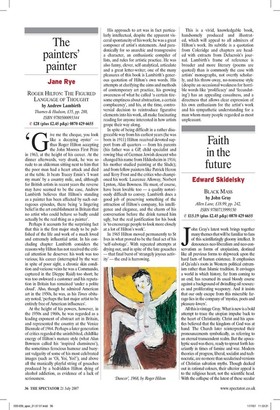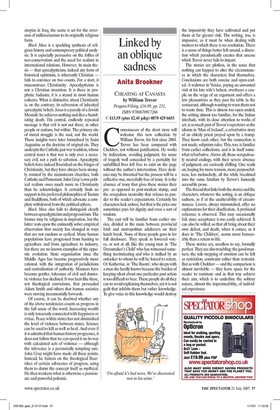Faith in the future
Edward Skidelsky BLACK MASS by John Gray Allen Lane, £18.99, pp. 242, ISBN 9780713999150 © £15.19 (plus £2.45 p&p) 0870 429 6655 qjohn Gray's latest work brings together many themes that will be familiar to fans of this scintillatingly gloomy intellect. It denounces neo-liberalism and neo-conservatism as forms of utopianism, destined like all previous forms to shipwreck upon the hard facts of human existence. It emphasises al-Qa'eda's roots in Western political extremism rather than Islamic tradition. It envisages a world in which history, far from coming to an end, has resumed its usual bloody course against a background of dwindling oil resources and proliferating weaponry. And it insists that our only escape from this miserable farrago lies in the company of 'mystics, poets and pleasure-lovers'.
All this is vintage Gray. What is new is a bold attempt to trace the utopian impulse back to the heart of Christianity. Christ and his apostles believed that the kingdom of God was at hand. The Church later reinterpreted their pronouncements symbolically, as referring to an eternal transcendent realm. But the apocalyptic seed was there, ready to sprout forth luxuriantly in times of famine and war. Modern theories of progress, liberal, socialist and technocratic, are no more than secularised versions of Christian salvation myths. Though decked out in rational colours, their ulterior appeal is to the religious heart, not the scientific head. With the collapse of the latest of these secular utopias in Iraq, the scene is set for the reversion of millenarianism to its originally religious form.
Black Mass is a sparkling synthesis of religious history and contemporary political analysis. It is especially persuasive on the follies of neo-conservatism and the need for realism in international relations. However, its main thesis — that apocalypticism, indeed any form of historical optimism, is inherently Christian fails to convince on two counts. For a start, it misconstrues Christianity. Apocalypticism is not a Christian invention. It is there in prophetic Judaism; it is a strand in most human cultures. What is distinctive about Christianity is, on the contrary, its subversion of inherited apocalyptic beliefs. Jesus is a parody of a Jewish Messiah: he achieves nothing and dies a humiliating death. His central, endlessly repeated message is that evil is not out there, in other people or nations, but within. The primary site of moral struggle is the soul, not the world. These insights were later formalised by Saint Augustine as the doctrine of original sin. They underpin the Catholic just-war tradition, whose central tenet is that war is only ever a necessary evil, not a path to salvation. Apocalyptic beliefs have indeed flourished on the fringes of Christianity, but they have always been strongly resisted by the mainstream churches, both Catholic and Protestant. John Gray's own political realism owes much more to Christianity than he acknowledges. It certainly finds no support in his preferred philosophies of Taoism and Buddhism, both of which advocate a complete withdrawal from the political sphere.
Black Mass also fails to distinguish clearly between apocalypticism and progressivism. The former may be religious in inspiration, but the latter rests upon the eminently sober empirical observation that society has changed in ways that are not random or cyclical. Many human populations have progressed from hunting to agriculture and from agriculture to industry, but there are no known examples of the opposite evolution. State organisation since the Middle Ages has become progressively more rational, with the integration of jurisdictions and centralisation of authority. Manners have become gentler, tolerance of civil and domestic violence has declined. It was facts like these, not theological convictions, that persuaded Adam Smith and others that human societies were moving incrementally forwards.
Of course, it can be doubted whether any of the above tendencies counts as progress in the full sense of the word. Increasing wealth is only tenuously connected with happiness or virtue. Peace within states has not diminished the level of violence between states. Science can be used to kill as well as heal. And even if it is admitted that human history progresses, it does not follow that we can speed it on its way with calculated acts of violence — although the inference is a perennially tempting one. John Gray might have made all these points. Instead, he fastens on the theological flourishes of certain advocates of progress, using them to damn the concept itself as mythical. He thus weakens what is otherwise a passionate and powerful polemic.













































 Previous page
Previous page